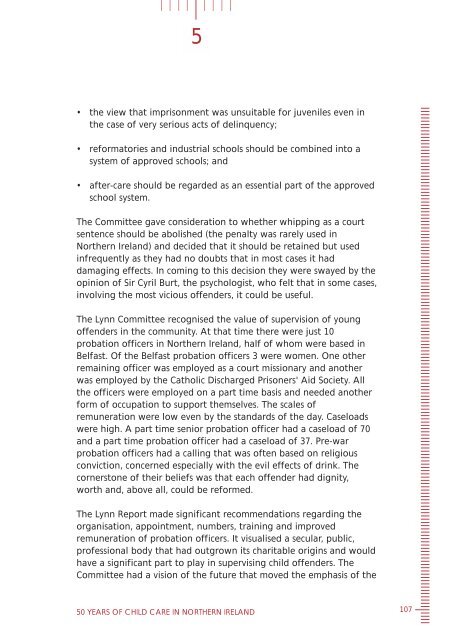childcare-50years
childcare-50years
childcare-50years
You also want an ePaper? Increase the reach of your titles
YUMPU automatically turns print PDFs into web optimized ePapers that Google loves.
5<br />
• the view that imprisonment was unsuitable for juveniles even in<br />
the case of very serious acts of delinquency;<br />
• reformatories and industrial schools should be combined into a<br />
system of approved schools; and<br />
• after-care should be regarded as an essential part of the approved<br />
school system.<br />
The Committee gave consideration to whether whipping as a court<br />
sentence should be abolished (the penalty was rarely used in<br />
Northern Ireland) and decided that it should be retained but used<br />
infrequently as they had no doubts that in most cases it had<br />
damaging effects. In coming to this decision they were swayed by the<br />
opinion of Sir Cyril Burt, the psychologist, who felt that in some cases,<br />
involving the most vicious offenders, it could be useful.<br />
The Lynn Committee recognised the value of supervision of young<br />
offenders in the community. At that time there were just 10<br />
probation officers in Northern Ireland, half of whom were based in<br />
Belfast. Of the Belfast probation officers 3 were women. One other<br />
remaining officer was employed as a court missionary and another<br />
was employed by the Catholic Discharged Prisoners' Aid Society. All<br />
the officers were employed on a part time basis and needed another<br />
form of occupation to support themselves. The scales of<br />
remuneration were low even by the standards of the day. Caseloads<br />
were high. A part time senior probation officer had a caseload of 70<br />
and a part time probation officer had a caseload of 37. Pre-war<br />
probation officers had a calling that was often based on religious<br />
conviction, concerned especially with the evil effects of drink. The<br />
cornerstone of their beliefs was that each offender had dignity,<br />
worth and, above all, could be reformed.<br />
The Lynn Report made significant recommendations regarding the<br />
organisation, appointment, numbers, training and improved<br />
remuneration of probation officers. It visualised a secular, public,<br />
professional body that had outgrown its charitable origins and would<br />
have a significant part to play in supervising child offenders. The<br />
Committee had a vision of the future that moved the emphasis of the<br />
50 YEARS OF CHILD CARE IN NORTHERN IRELAND<br />
107


